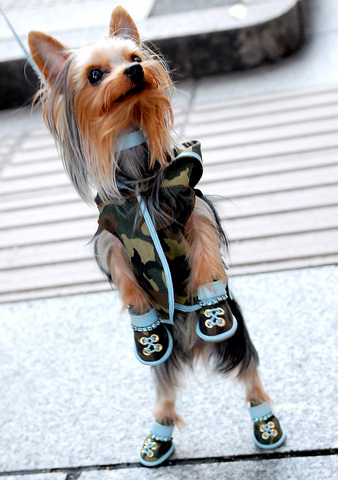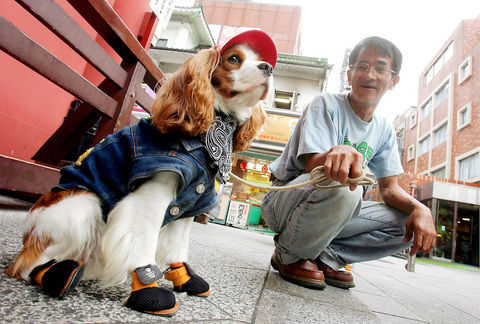Andy has sprouted white whiskers, suffers from lower back pain and no longer bounds up the stairs like he used to.
Still, the 11-year-old Siberian husky isn't lying idle: every week he meets his personal trainer for a run on an underwater treadmill, does laps in a doggy pool to strengthen his hind legs and unwinds with a hot spa and massage session.
The boom in pet ownership in Japan has led to a new phenomenon: legions of elderly animals that doting masters pamper with fortified food and vitamins, aromatherapy and even acupuncture.

PHOTOS: EPA
"I want to do everything I can for Andy. He's part of the family," said Aya Ashiya, 50, of Tokyo as she ran around the swimming pool with a squeeze toy, cheering the husky on during a recent session at the dog aqua fitness gym El Pero.
"We've been together for so long, and we've really learned to communicate," Ashiya said. "I just want him to stay healthy for as long as possible."
Though figures are scarce, a study published last year showed that longevity for cats in Japan almost doubled between 1991 and 2003, from 5.1 years to 9.9 years. Dog longevity surged from 8.6 years to 11.9 years.

Researchers attribute the jump to better health care, more vaccinations, a more balanced diet and a new trend of pets being allowed to live in homes — once unthinkable in a country of tatami-mat houses.
But longer lives have led to ailments seldom seen before in pets in Japan, such as cancer, diabetes, heart disease and dementia, said Hideki Hayashidani, an assistant professor at the Tokyo University of Agriculture and Technology, who carried out the longevity study.
"Japanese attitudes toward pets have changed radically. Owners dote over them like children," Hayashidani said. "That means fewer pups and kittens die from infections, while cancer and heart disease cases have hit the roof ... And owners will pay anything to keep their pets alive longer."
Kyuta, an eight-year-old long-haired Chihuahua, started biweekly acupuncture sessions at the Kamakura Genki Animal Hospital after severe back pain struck last year.
At a recent session, the dog gave yelped as a veterinarian inserted 13 needles into his quivering back and hind legs, but soon settled down in his owner's arms.
"Kyuta loves coming here. His tail goes right up when he gets on the examination table," said Emi Matsuya, 43, a Tokyo hairdresser.
The pair travel two hours each way by train for the acupuncture sessions, which cost US$47, Matsuya said, and the Chihuahua eats homemade meals of meat and vegetables now he is getting older.
"Dogs crave attention — that's what makes them happy. And happy dogs live longer," said hospital director Takashi Ishino, who also offers massage and aromatherapy treatments.
Japan's aging dogs also benefit from specially designed care items such as doggie diapers, harnesses that support aging pooches on walks and pet strollers. Elderly cats have their own products, including climbing towers with extra padding.
And owners can take a break from their pets by getting a nursing care specialist. Keiko Himi, who runs the pet-sitting service "Nyan to Wonderful" northeast of Tokyo, says an increasing number of owners ask her to care for aging pets while they run errands or work.
"Caring for old pets is a big burden for the owner, physically and emotionally," Himi said. "In one case, I went to help a family every day through their dog's last days." Death doesn't end the pampering. A spate of companies offers everything from pet cemeteries, funerals and memorials to counseling for grieving owners. Tokyo's Japan Pet Ceremony Co. runs a 24-hour funeral hot line; the Machida Izumi Joen cemetery offers the ultimate in owner-pet companionship: a shared grave.
"It's all about giving dogs a certain quality of life," said Ashiya, the Siberian husky owner. "We're not going to give up just because Andy's old ... not as long as I have the energy, time, and money."

April 28 to May 4 During the Japanese colonial era, a city’s “first” high school typically served Japanese students, while Taiwanese attended the “second” high school. Only in Taichung was this reversed. That’s because when Taichung First High School opened its doors on May 1, 1915 to serve Taiwanese students who were previously barred from secondary education, it was the only high school in town. Former principal Hideo Azukisawa threatened to quit when the government in 1922 attempted to transfer the “first” designation to a new local high school for Japanese students, leading to this unusual situation. Prior to the Taichung First

The Ministry of Education last month proposed a nationwide ban on mobile devices in schools, aiming to curb concerns over student phone addiction. Under the revised regulation, which will take effect in August, teachers and schools will be required to collect mobile devices — including phones, laptops and wearables devices — for safekeeping during school hours, unless they are being used for educational purposes. For Chang Fong-ching (張鳳琴), the ban will have a positive impact. “It’s a good move,” says the professor in the department of

On April 17, Chinese Nationalist Party (KMT) Chairman Eric Chu (朱立倫) launched a bold campaign to revive and revitalize the KMT base by calling for an impromptu rally at the Taipei prosecutor’s offices to protest recent arrests of KMT recall campaigners over allegations of forgery and fraud involving signatures of dead voters. The protest had no time to apply for permits and was illegal, but that played into the sense of opposition grievance at alleged weaponization of the judiciary by the Democratic Progressive Party (DPP) to “annihilate” the opposition parties. Blamed for faltering recall campaigns and faced with a KMT chair

Article 2 of the Additional Articles of the Constitution of the Republic of China (中華民國憲法增修條文) stipulates that upon a vote of no confidence in the premier, the president can dissolve the legislature within 10 days. If the legislature is dissolved, a new legislative election must be held within 60 days, and the legislators’ terms will then be reckoned from that election. Two weeks ago Taipei Mayor Chiang Wan-an (蔣萬安) of the Chinese Nationalist Party (KMT) proposed that the legislature hold a vote of no confidence in the premier and dare the president to dissolve the legislature. The legislature is currently controlled